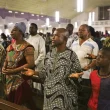Introduction
This work critiques David Oyedepo’s charismatic approach to solving the problems of vocation, work, and faith in the African context. It is not in any way to undermine the great work and sacrifice that Oyedepo has made over the years in contributing to the progress of Africa as a whole. Since the inception of Oyedepo’s public ministry in 1981, his ministry’s input has produced remarkable achievements that are truly commendable. Still, there is a need to upend other theological shortfalls undermining his bogus contribution to the body of Christ.
These theological misinterpretations need urgent re-examination for a more robust outcome.
Oyedepo’s ministry is a global phenomenon with over 21,000 vibrant local churches across the length and breadth of Nigeria alone and several thousand other churches planted on the 6 major continents of the earth. This ministry has made a significant impact in the educational sector. Notably, the founding of two vibrant Universities, namely Covenant University, Canaanland Ota, and Landmark University, Omu-Aran. In addition, his ministry founded countless Secondary schools, as well as Nursery and Primary schools across various countries of Africa.
Despite all these remarkable achievements, Oyedepo’s theological understanding of vocation, work, and faith is uneven because of his overemphasis on the theology of giving. His theological interpretation of ‘kingdom’ is aligned with ‘tithing to the church, over and above vocational principles that guarantee better and rapid cultural advancement. While I affirm tithing, Oyedepo’s messiah complex and the unintended consequential exploitation of the poor through faith teaching are major sources of concern and in contradiction to both his intentions as well as Christ’s approach to the religious extortion of tithes from the poor (Matthew 21:12-17; Mark 11:15-19; Luke 19:45-48; John 2:13-16). Oyedepo boldly proclaimed his liberation mandate after the order of Moses, specifically for the people of Africa. His call narrative is so contagious and echoes the qualities of a man who is truly on a mission. Oyedepo’s call resembles Howard Thurman’s statement, “I love Jesus for the shaft of light that he throws across the pathway of those who seek to answer the question, what shall I do with my life?”
As grand as Oyedepo’s call narrative seems, and judging by the consequential effect on the common church workers and members at scale, I am somewhat uncomfortable with his theological framework and disposition on vocation, work, and faith. He seems to be locked up in the New Testament view, which Volf argues to be devoid of the “gospel of work”. The New Testament view of work is unlike the Old Testament, which views the purpose of work as not merely for sustenance but also as cultural development. Oyedepo does not preach against working; he affirms it and believes that a time is coming when believers will occupy the most prestigious positions in all walks of life. But this feat is only attainable by his model of unrelenting financial giving in season and out of season by all believing saints. Without any question or doubt, Oyedepo values work as a vocation, but he believes that giving life is superior to the pursuit of rapacious intellectual development. He cannot reconcile placing the vocational call of giving on the same pedestal as other vocational principles.
For Oyedepo, I will say that the ratio is 3:1 in favor of vocational giving. From Oyedepo’s perspective, it is ‘giving,’ especially tithing to his ministry, that is the solution to the nagging problem of humanity. To a mammoth crowd at the end of the Shiloh 2016 program in December, Oyedepo quoted from Job 29:4 (NRSV): “As I was in the days of my youth when the secret of God was upon my tabernacle.” Then he reflected, “They were trading intellectual secrets, but I was trading divine secrets, and I beat them hands down.” Oyedepo concluded by saying, “That was what made Job the greatest of all the businessmen of the civilized world of his time.” In a nutshell, this critique will identify Oyedepo’s charismatic approach to the problem of vocation, work, and faith, and examine the type of theological worldview that is shaping and influencing Oyedepo, point out the potential pitfall of such a theological worldview, and subsequently, propose an alternative way out of the theological gap created by Oyedepo’s theological leaning.
What is David Oyedepo’s Driving Force?
To critically investigate David Oyedepo’s charismatic approach in addressing the problem of vocation, work, and faith in the African context, one must understand his main driving force and underscore his theological predisposition. David Oyedepo has always emphasized that his liberation mandate is in the same class as Moses and after the order of Joshua’s call to lead the children of Israel from the wilderness of life into their land of inheritance in Canaan. Hence, the name of the location of the headquarters of the ministry in Ota, Ogun State, Nigeria, is Canaanland, which started as 530 acres of land, now running into several thousand acres of land. Oyedepo’s self-description as a liberator qua Moses has other parallels in Christian history, such as the description that Eusebius offers to portray Emperor Constantine, although it is Oyedepo who has described himself this way. The driving force behind David Oyedepo can be found in his personal call narrative. According to him, this instigating ‘call’ lasted eighteen hours in an open vision, where, in his words, he says:
I saw men and women file past my front groaning and agonizing for rescue. I was caught up in the wailing and the sobbing that I joined sobbing and agonizing with them “ekun oro”, it was an intense wailing. I saw people bartered, tattered, deformed, groaning, and agonizing for rescue. And I begin to ask, why Lord? why Lord? And God said, “…and
from the beginning, it was not so,” I said why are you showing me all these? He said, “The hour has come to liberate the world from all oppression of the devil through the preaching of the word of faith and I am sending you to undertake this task”
Oyedepo’s call narrative parallels Howard Thurman’s statement that “I love Jesus for the shaft of light that he throws across the pathway of those who seek to answer the question, what shall I do with my life? Thurman used the temptation narrative of Jesus in the wilderness where Satan invited Him to turn stone to bread, and Jesus responded that “man does live by bread alone” (Matthew 4:4). Thurman pointed out how there is more to satisfying the hunger of the hour with bread, and that instead, effort should be made towards meeting the unverbalized needs too. Priority should be given not merely to those desires and yearnings that guarantee economic security, but much more importantly, to those needs which are deeper than food. This deeper need of the people is the need that Oyedepo, without doubt, was able to identify and target, which is exemplified in his call narrative.
From the socio-economic perspective, perhaps the greatest need of the people of Africa is freedom from poverty, which may be attributed to the snowball effect of colonization and slave trade activities that ravaged the continent in the seventeenth and eighteenth centuries. Other causes are poor leadership attributes from the successive continent’s leaders from the abolition of the slave trade to the contemporary period, and a lack of vocational discernment among the Africans. This is the prevailing socio-economic situation that is besetting the continent and requires an urgent solution. Unfortunately, today the political class has not been able to rise to the occasion, which is evident in their inability to provide the basic social infrastructural facilities for the flourishing of Africans. The continent is deficient in the provision of good education, sufficient health care services, good road networks, electricity, and basic socio-economic development. Oyedepo has been able to secure leverage through these failures and poor state of affairs to amplify his call as a “messiah of this generation”. He told a large crowd that gathered from 192 nations of the world that “God sent me to help you out of this squalor- a state of being extremely dirty and unpleasant, especially because of poverty or neglect”.
Oyedepo believes that the rising spate of catastrophic events across the globe, as well as the sorry state of Africa, is a fulfillment of the prophetic warning in the scriptures. He bases his argument on Malachi 4:1-2, Genesis 47:15-19, and Isaiah 60:1-2. These scriptures depict a period of socio-economic catastrophe for all people, with the exception of only the children of God. Oyedepo claimed in his sermon, thus:
God told me that ‘the destiny of this age has been committed into my hand’. Many people carry beyond their nation’s anointing. People from all over the world are gathered together because God is addressing a global issue and is addressing the Universal Body of Christ to get ready and be part of the change that God has prepared for his people.
Throughout his sermons at Shiloh 2016, Oyedepo was trying to rally as many people as possible across the world to buy into his proposed model of solution to the world socioeconomic catastrophe. He argued that his model can overturn the problem bedeviling the global community. During the 2016 edition of the annual event, Oyedepo stood in his prophetic office and predicted a futuristic holocaust in all the nations of the world but emphasized the miraculous exemption of those who genuinely serve the cause of the Gospel.
What Platform is Oyedepo Using to Address the Socio-economic Depravity in Africa?
The liberation mandate of David Oyedepo is anchored on the prophetic gathering of men, women, and children across the nations of the world, which he claims to have received from God in 1981, and replayed yearly in a gathering together at Shiloh. The history of Shiloh as a yearly event is traceable to the first annual convocation of the Winners’ Family Worldwide in September 1999, during the dedication of the single largest auditorium in the world (Faith Tabernacle), which is now held in the second week of December of every year. Shiloh is a week-long program that includes marathon word sessions, a Businessmen’s Summit, a Youth Rally, a Ministers’ Conference, and specialized Healing Classes.
This “Shiloh” event takes its name from Joshua 18:1-3 NRSV
And the whole congregation of the Israelites assembled at Shiloh and set up the tent of meeting there. The land lay subdued before them. There remained among the Israelites seven tribes whose inheritance had not yet been apportioned. So, Joshua said to the Israelites, ‘How long will you be slack about going in and taking possession of the land that the Lord, the God of your ancestors, has given you’?
In the operational manual of the church, “The Mandate,” Oyedepo declared that Shiloh is a place where everyone’s pending inheritance would be delivered to him or her… Shiloh is like the epitome of the Liberation Mandate for each year. At that event, God also gets us set to launch us into the following year. Since 1999, Shiloh has proved to be what God said it would be. It is not just a church program; it is a prophetic gathering ordained to deliver everyone’s inheritance to him or her.
It is therefore from this background that Oyedepo tagged the 2016 Shiloh event with the theme “My Case is Different,” which reflects on the socio-economic and political contexts of the hour, especially the African landscape. Oyedepo sternly warned the people gathered at the gathering of the Shiloh 2016 event not to “toy with what is happening right now. That was how people thought that the Flood was a joke, while they were speaking “grammar,” the door to the ark was shut. All the proud, who are saying, forget what they are talking about. They would lick the dust…”
See, the day is coming, burning like an oven when all the arrogant and all evildoers will be stubble; the day that comes shall burn them up, says the Lord of hosts, so that it will leave them neither root nor branch. But for you who revere my name, the sun of righteousness shall rise, with healing in its wings, you shall go out leaping like calves from the stall”. (Malachi 4:1-2)
Oyedepo believes that his job now is to embark on a rescue mission, particularly after hearing the voice of God in 1987 when he was on a trip to the United States of America. He claimed that God told him to “get back home and make my people rich.” This, he has been attempting to accomplish through the annual Shiloh event.
What Tools or Models is Oyedepo Using to Get His Task Accomplished?
Honestly, I share in Oyedepo’s urgency and passion to work assiduously and provide a way out for the people of Africa, people who, in his open vision, were crying and agonizing in pain for rescue from their state of despondency. However, I differ a little from his approach, particularly from his model of accomplishment, which gives as much as 75% emphasis on tithing, offering, kingdom promotion offering, and sacrificial offering, and just 25% on the principles that make one excel in his vocation, work, or calling. Not that it is wrong for people to give a tithe, offering, and other kingdom obligations, but I also affirm these kingdom practices. But my point of disagreement is in apportioning 75% devotion to this practice, which I believe could be misleading and perhaps a leading factor contributing to the lack of cultural advancement among the Africans. What this model seems to suggest is that giving, especially giving money to the cause of the church, is the main solution to the present socio-economic downturn on the continent.
At best, what this model does is enrich the church while the members wait endlessly for a return on their tithe without the commensurate work ethic that results in multiplied resources. The tithing may reinforce learned helplessness, as some forms of faith do result in learned helplessness. Oyedepo argued that when the people faithfully commit themselves to doing and fulfilling these kingdom obligations, what will remain is the “blessing!” (Genesis 30:38-42). As noble as that may sound, religious people are then deluded about the role that actual work and vocational skills play in any endeavor. His model, I argue, makes the people intellectually irresponsible and causes Christians to fool themselves into the expectation of a blessing that they lack the required vocational skills to generate. Oyedepo’s ratio of 3:1 will only favor the church as an institution but continue to render the people impoverished.
Oyedepo in his Shiloh 2016 sermon, rhetorically reiterates a heart for God (Proverbs 23:26, Matthew 6:21, 1 Kings 8:18) and faith, as other ingredients required to overturn the present challenges facing the continent. I agree that those ingredients do have a place in the practice of one’s faith but should never be substituted for vocational know-how which many people in Africa lack, unlike their counterparts in America, Europe, and emerging Asian countries. Other cultures are using their vocational know-how to advance their culture and thereby bring prosperity to their people. During the Shiloh 2016 event, Oyedepo often made prophetic declarations of miracle jobs for the participants when it was obvious that there were no jobs anywhere. These dear people of God are deficient in skills and vocational know-how and Oyedepo’s prophesies of miracle jobs only seem to me, to neglect the root problem and even ignore its symptoms, the very people clamoring for a way out.
What is Oyedepo’s Theological Framework on Vocation, Work, and Faith?
There are two theological positions regarding the fate of our world. Some believe in the world ending in apocalyptic destruction and those who believe that the world will experience eschatological transformation. Oyedepo, though unclear about which assumption he favors, acknowledges the two positions in his sermons but seems to lean more on the assumption of the ‘transformation mundi’ with his “gospel of exemption” for the people of God from the impending apocalyptic catastrophe. Oyedepo believes there will be a worldwide holocaust, which will provide an opportunity for the children of God to triumph. He didn’t proclaim the discontinuity of our present world that will be occasioned by the predicted holocaust, but rather foresaw a world that will be governed by only the righteous or the just (Psalm 37:18-19, Malachi 4:2, Job 22:23-24). Oyedepo told the people during the Shiloh 2016:
God sent me to help you out of this squalor that is about eating up the world. It was so bad at that time, but Israel dwelt in the land of Egypt, in the country of Goshen; and they had possessions therein, and grew, and multiplied exceedingly (Genesis 47:29).
At the same time when others were offering themselves for sale, God made a difference between his people and others. There is going to be a repeat of that. It’s already on, and the number will keep enlarging, but you will not be left behind. Same time, the God of exemption exempted his people same time. The earth shall burn, not one nation; there shall be no nation to run to. No matter what they are selling, we will be the ones buying with pure money, unquestionable resources.
Although Oyedepo predicted an apocalyptic catastrophe, he emphasized exemption for all God’s people and situated his argument within the backdrop of what happened between the children of Israel and the Egyptians during their sojourn in Egypt.
The Potential Pitfall of Oyedepo’s Theological Emphasis
It is problematic to operate with Oyedepo’s theological model of “exemption” during an apocalyptic catastrophe, particularly from his understanding of vocation, work, and faith. Oyedepo’s insistence that the Bible is made of 75% instructions and 25% principles is faulty; his sole text used for this argument is 2 Timothy 3: 16. The so-called “secret of exemption”- tithing, offering, kingdom promotion, offering sacrificial giving to the charity, only favors the religious elites of the church and not the people. Exemption strategies will not provide the necessary infrastructures within the society to combat some of the societal ills he predicted; the model will not work in our increasingly mobile industrial and information society, where it is the workers who succeed by intellectual know-how.
Pope John Paul II expressed it this way, “while it is true that man eats the bread produced by the work of his hands- and this means not only the daily bread by which his body keeps alive but also the bread of science and progress, civilization and culture- it is also a perennial truth that he eats this bread by ‘the sweat of his face.’” Pope John Paul acknowledged the challenges facing our world of the workplace since the nineteenth century. Technological disruption is causing a loss of jobs everywhere; I don’t think that laying 75% emphasis on the “secret of exemption” as preached by Oyedepo will solve these problems either. Oyedepo is probably hoping that his spiritual strategies of giving will provide the way out. He seems to relegate the role of the intellectual approach to the background. He is still locked up in the New Testament view, which Volf says is devoid of the “gospel of work”.
For instance, in the New Testament, Jesus left his carpenter’s tools for a public ministry. He also called his disciples away from their occupations into a full-time ministry. What Oyedepo seems to unknowingly echo is the explicit command found in the epistles to work, which only has the intention of serving the needs of the workers and their neighbor rather than serving as an instrument of cultural advancement. Therefore, the prevailing Christian theology of work and the lack of New Testament emphasis on the same from more than mere sustenance of workers and their neighbors is influencing Oyedepo’s theology of exemption in that two-thirds of attention is on giving financial resources to the church compared to one-third attention he assigned the development of the vocational skills required to excel in life or advance the society. A more pragmatic approach to addressing the same problem was adopted by Pope John Paul II when he wrote in the Laborem Exercens lamenting the state of human work.
We are celebrating the ninetieth anniversary of the Encyclical Rerum Novarum on the eve of new developments in technological, economic, and political conditions which, according to many experts, will influence the world of work and production no less than the industrial revolution of the last century. There are many factors of a general nature: the widespread introduction of automation into many spheres of production, the increase in the cost of energy and raw materials, the growing realization that the heritage of nature is limited and that it is being intolerably polluted, and the emergence of the political scene of people who, after centuries of subjugation, are demanding their rightful place among nations and in the international decision-making. These new conditions and demands will require a reordering and adjustment of the structures of the modern economy and the distribution of work. Unfortunately, for millions of skilled workers, these changes may perhaps mean unemployment, at least for a time, or the need for retraining. They will very probably involve a reduction or less rapid increase in material well-being for the more developed countries. But they can also bring relief and hope to the millions who today live in conditions of shameful and unworthy poverty.
My Proposed Solution for Filling the Theological Gap
Oyedepo’s charismatic approach to addressing vocational concerns is inadequate, and I am proposing different forms of solutions to close the theological gap he has created, particularly among Africans. I would implore Oyedepo to update his theology on the primary role of work in the advancement of any society and not relegate intellectual capacity and skill development to the background. While the church is encouraged to teach the people about Biblical precepts that would be helpful for the faith journey, the church should desist from de-emphasizing what is in the larger interest of society because it wants to make certain Biblical precepts popular.
I want to propose the establishment of more non-governmental organizations that are geared toward helping people develop vocational skills and entrepreneurial drive. Though the church institution is a non-governmental organization, it’s limited in scope in this area. They can only proffer spiritual solutions for their members. The church is deficient in its ability to meet the vocational needs of the people. Oyedepo, through his call narrative, has identified a genuine vocational need for the people of Africa, but his approach is tending towards creating a viable ministry as an institution rather than equipping the people with vocational skills for national development. His 75% instructional model of tithing and kingdom obligations does not solve the problem of the people. What it does is give them false hope of a better return on their kingdom investment. The other 25% of his model is based on principles, though acknowledged by Oyedepo as vital, these principles are not given a prominent place in his teaching. This is what is barely missing in the body of Christ, which is being given the least emphasis.
In addition to this, I have identified a lack of access to information, particularly the one related to business opportunities, as one of the greatest factors militating against Africans in their pursuit of vocational options. A concerted effort should be made to continue to emphasize skill development rather than the spiritual vocation of giving. People should be taught how to improve their productivity and skills rather than wishing for miracles arising from the dependency created by financial ‘kingdom’ obligations.
The people of Africa should be carefully guided, like their counterparts in other continents, to find their passion and, consequently motivated to continually work for the development of their dignity and equal or greater socio-economic prosperity. Vocation is not merely working in the church or working solely for the interests of the church through unrestrained giving without a commensurate work skill to improve Africa’s socio-economic status.
Conclusion
Oyedepo, like every other man whom Jesus has assisted to find their life purpose, is not just seeking to offer humanity bread to satisfy their immediate stomach needs or economic security. He longed to satisfy that which is deeper than mere “bread alone.” But his charismatic approach to meeting this challenge needs to be re-examined. It is lopsided and will not ultimately favor the people. Oyedepo needs to put the needs of the people’s vocational skills before the financial needs of the church. That way, the people will be enriched and the church will also prosper. Currently, the church is prospering, but at the expense of people who are not making enough vocational progress. This critique is not far-fetched, but simply the recognition of the injustice of a 75% emphasis on tithing against the unceremonious 25% acknowledgment of vocational principles that are the main tenets for people’s growth. If the apportioning of the percentage were carefully reevaluated, I believe a lot of progress would be made, such that the church and the people would be blessed concurrently.
If you are passionate about writing and understand the power to shape culture through writing, please contact us immediately, and our representatives will walk you through how you can join our team of writers at the Africana Leadership Digest.












